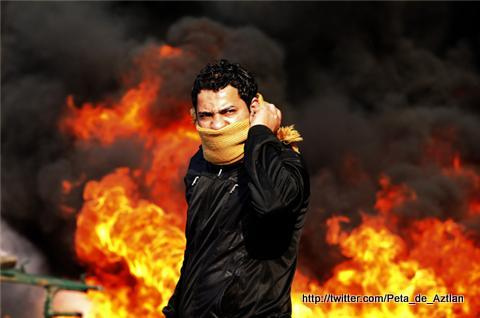
The Egyptian social sphere witnessed many changes since the eruption of the 25 January revolution. The daily protests that Egypt has become accustomed to were not a frequent scene under Mubarak’s regime. In fact, in March alone Egypt had the highest rate of protest worldwide. Alongside the traditional understanding of resistance, Egypt’s youth innovated new ways of expressing their opinions, either by taking to the streets or through other politically-related manifestations.
Immediately after President Mohamed Morsi won the presidential elections, a group of creative activists created ‘MorsiMeter’, an initiative aiming to assess the performance of Morsi, documenting the issues he pledged to address in the first 100 days of his term. They created a Facebook page and a website to monitor the 64 tasks Morsi promised to fulfill. Regardless that Morsi has not, until the moment, fulfilled half of his promises, the creators of MorsiMeter managed to provide a unique way of holding Morsi accountable , and created a report documenting the president’s performance at the end of the first 100 days. The Facebook page attracted more than 120,000 fans out of which 20,000 joined the page just a few hours after it was created.
The use of political satire and humor was seen during the 18 days in Tahrir Square, through the use of creative and amusing signs held up by protesters. This phenomenon has found a permanent home online on the social networking site Facebook. Egypt Sarcasm Society and Asa7be Sarcasm Society invite their fans to post comics that are not necessarily political in nature, although most of their content tends to address current affairs in Egypt. This phenomenon was not widespread before the revolution. Beyond political jokes told behind closed doors, and occasional political cartoons in Egypt’s newspapers, it has now become a new method to address political and social issues in a funny yet critical manner, with social media democratizing the process and allowing anyone with an internet connection to participate.
When Morsi imposed a curfew on the Canal cities of Port Said, Ismailiya, and Suez following the violent clashes that took place after the verdict of Port Said football massacre was issued, another creative manifestation of opposition was initiated by youth. The residents of the cities defied Morsi’s curfew, announcing that they would hold football matches on the streets at the time of the curfew. The fact that those matches were actually held showed not only a peaceful, but also creative, form of resistance against Morsi’s decision. Football fever also reached Cairo, as youth organized a football league by the Muslim Brotherhood (MB) headquarters in Moqattam.
Football matches in front of the Muslim Brotherhood headquarters were also soon followed by another form of protest in the form of a viral internet craze sweeping YouTube. On 1 March, hundreds of Egyptian youth performed the ‘Harlem Shake’ dance in front of the MB’s Moqattam headquarters in an act denoting their opposition Morsi, and the Muslim Brotherhood’s, policies
One of the most creative initiative yet was seen in the April 6 Movement’s decision to enter Morsi’s into competition to win ‘a trip to space’. The competition winners would be chosen through an online voting, and in no time, Morsi was in the number one spot, before April 6 withdrew their nomination, saying that they had achieved their goal. The initiative, while clearly done in jest, did still make a strong statement about April 6’s resistance of Morsi.
The April 6 Movement also held a protest in the vicinity of Morsi’s home in the Fifth Settlement in March, where they spread animal feed on the street facing Morsi’s house for perceiving him and the MB as sheep for their ‘blind obedience’ doctrine. One week later, the movement held another protest in front of the interior minister’s house, where they held women undergarments and threw them at the house to signify the minister’s servility to Morsi’s regime. This protest in particular brought on harsh criticism from the Brotherhood’s political arm, the Freedom and Justice Party, describing it as “a symptom of moral collapse.”
The revolution has changed the way youth express their opinions in Egypt. Ordinary protests are no longer the only way to say oppose the ruling regime. These innovative approaches increase day by day, as Egyptian youth react to the decisions of the ruling regime. For that reason, I am convinced that the current charges against satirical TV host Bassem Youssef will yield nothing but more creative forms of opposition.
Photo: Peta de Aztlan
Image: egyyouth.jpg
